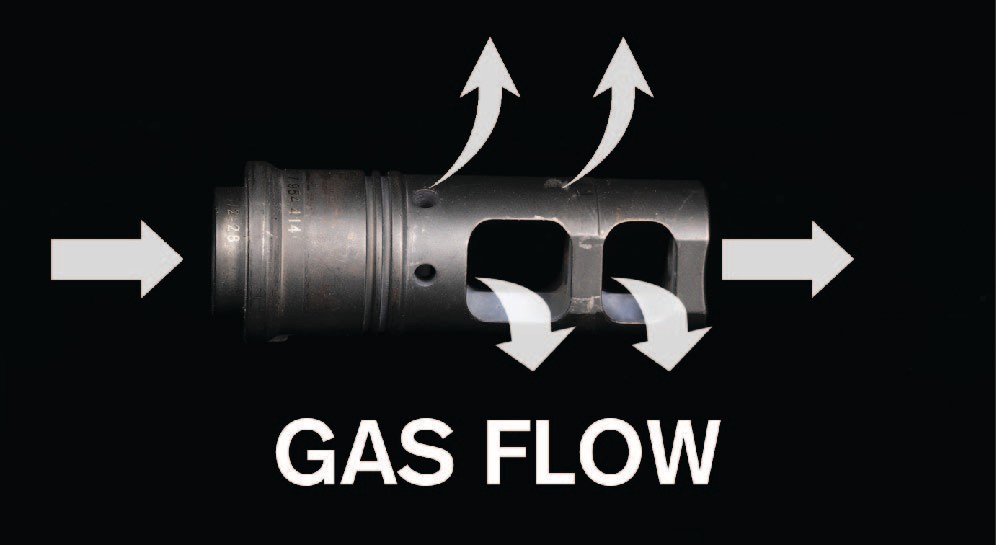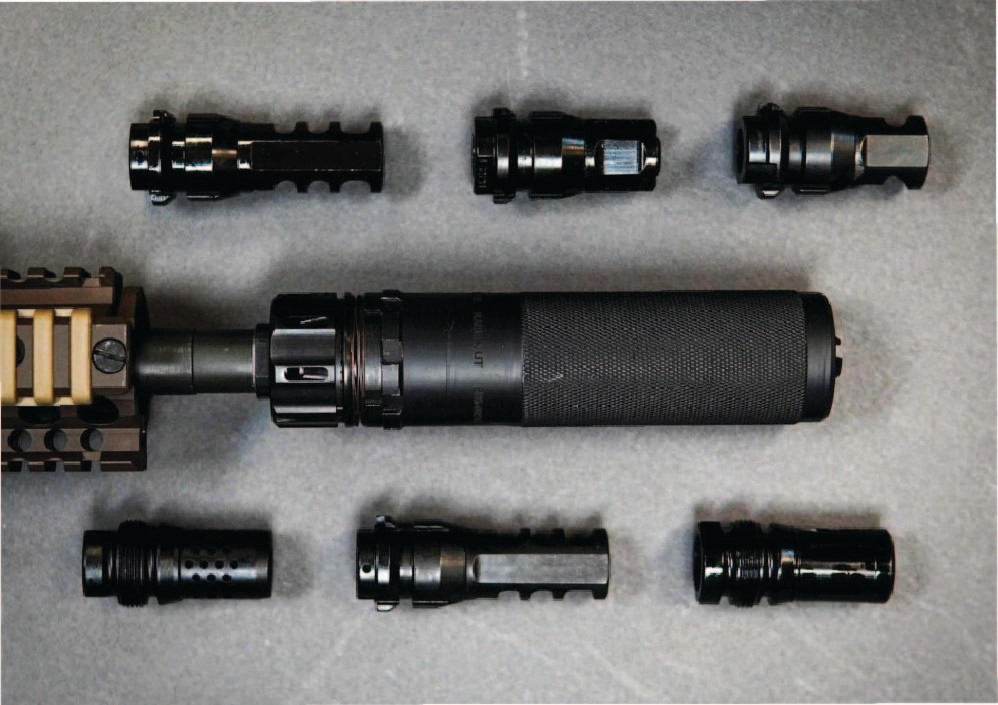

- A muzzle brake is a device that can easily be attached to threaded rifle barrels to reduce recoil.
- Muzzle brakes work by diverting the gases exiting the barrel of your firearm laterally or vertically to keep the rifle's muzzle down.
- Rifles with high recoil or high rates of fire can benefit significantly from using a muzzle brake.
- Suppressors using QD systems can also benefit from mounting to a muzzle brake as they can increase the durability of the suppressor.
What is a Muzzle Brake
A muzzle brake is a device that can be attached to your rifle to reduce the recoil you feel when shooting. Using a muzzle brake on your rifle will make it "kick" or recoil less and make you shoot more accurately. These muzzle devices work great on rifles with high rates of fire, such as an AR or AK platform rifle, as they will help keep you on target for follow-up shots. Muzzle brakes are also very popular on precision rifles and hunting rigs. These rifles often use high-power cartridges, such as 300WSM, with high recoil; installing a muzzle device will stop you from bruising your shoulder on your next hunt.
Table of Contents
How Does a Muzzle Brake Work
Muzzle brakes work by redirecting the gasses leaving your barrel after firing a round to counteract muzzle rise and recoil; this keeps you on target and makes the rifle feel softer shooting. When you fire a bullet from a gun with a bare muzzle, the gases exit directly out the barrel. This force drives the firearm back into you and causes your shoulder to act as a fulcrum point forcing the muzzle upwards. A muzzle brake takes those gases leaving the barrel and puts them to work; instead of pushing back on you, the brake redirects the gasses laterally and vertically, leading to less recoil and better accuracy. Dispersing the blast results in less force pushing back on you as the shooter (less recoil) and less muzzle flip.


Muzzle Brake Vs. Compensator
If you are trying to decide which muzzle device is suitable for your rifle, a muzzle brake or a compensator, you are not alone; we get asked this question daily by customers. If recoil reduction and minimal muzzle rise is your primary goal, a muzzle brake is the way to go, they are explicitly designed to reduce felt recoil. A compensator, like the Q Cherry Bomb, makes more sense if you want to make the rifle a little softer shooting but also want to mitigate some muzzle flash. Compensators are the "jack-of-all-trades" solution. They don't reduce recoil or flash as well as muzzle brakes or flash hiders, respectively, but they do a little of each.
Can You Put a Suppressor on a Muzzle Brake?
Muzzle devices like the SilencerCo ASR and Dead Air Keymo Muzzle Brakes make excellent suppressor mounts. These muzzle brakes have integrated quick disconnect or "QD" features that allow for quickly attaching a suppressor to your rifle. Using a system like this will enable you to retain the functionality of the muzzle brake when you take your suppressor off. Another benefit of using a brake to mount your silencer is increased durability; the muzzle brake's steel construction allows them to handle harsh muzzle blasts and disperse the pressure within the suppressor. Folks describe this as the muzzle brake acting as a "sacrificial baffle," which takes most of the concussion instead of the suppressor.


Credit: @DeadAirSilencers
The Pros and Cons of Muzzle Brakes
You might be weighing your options on which muzzle device best suits your setup. Here are some pros and cons of muzzle brakes that you should consider before you pull the trigger.
Pros
- Muzzle brakes reduce recoil, resulting in a softer shooting rifle, less kick, and less bruised shoulders.
- Muzzle brakes improve accuracy. Less recoil means a faster rate of fire because it takes less time to get on target.
- Muzzle brakes act as a sacrificial baffle when used with a silencer. This can provide another layer of protection for your silencer as you enjoy your suppressed range days.
Cons
- Muzzle brakes require timing to work as intended. The brakes must be properly aligned, but this process only takes a few minutes.
- Muzzle brakes can be very concussive and sound louder when not using a suppressor.
- Muzzle brakes will create more flash; if you shoot or hunt at night, you might opt for a suppressor or a flash hider.
Conclusion
If you're on the quest for the lightest recoiling rifle, you can add a muzzle brake is an excellent option for a muzzle device. These muzzle devices benefit an extensive array of weapons, from AR-15s used for tactical drills to large caliber bolt action rifles for taking down elk. Muzzle brakes also make great suppressor mounts, thanks to their robust design and build materials able to disperse muzzle blast and increase the durability of your suppressor.





